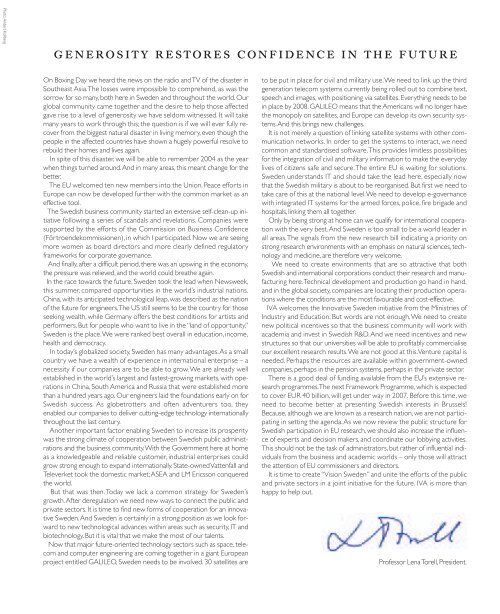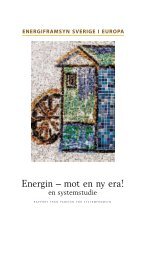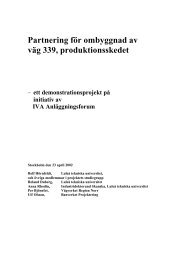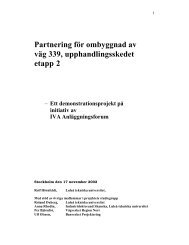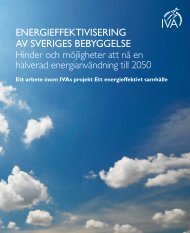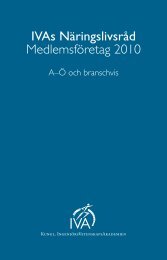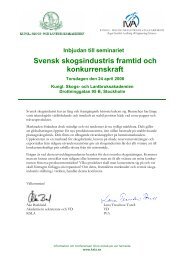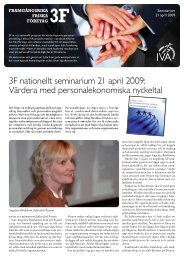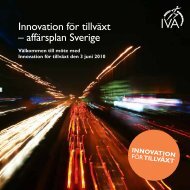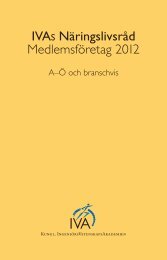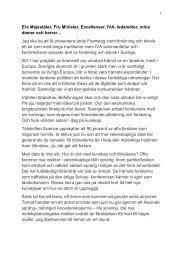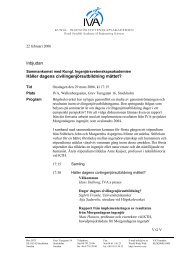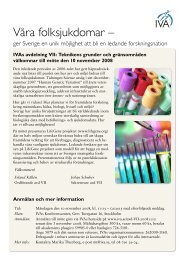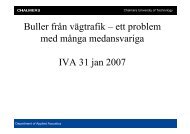ANNUAL REPORT 2004 - IVA
ANNUAL REPORT 2004 - IVA
ANNUAL REPORT 2004 - IVA
Create successful ePaper yourself
Turn your PDF publications into a flip-book with our unique Google optimized e-Paper software.
Photo:Anders Kollberg<br />
generosity restores confidence in the future<br />
On Boxing Day we heard the news on the radio and TV of the disaster in<br />
Southeast Asia.The losses were impossible to comprehend, as was the<br />
sorrow for so many, both here in Sweden and throughout the world. Our<br />
global community came together and the desire to help those affected<br />
gave rise to a level of generosity we have seldom witnessed. It will take<br />
many years to work through this; the question is if we will ever fully recover<br />
from the biggest natural disaster in living memory, even though the<br />
people in the affected countries have shown a hugely powerful resolve to<br />
rebuild their homes and lives again.<br />
In spite of this disaster, we will be able to remember <strong>2004</strong> as the year<br />
when things turned around.And in many areas, this meant change for the<br />
better.<br />
The EU welcomed ten new members into the Union. Peace efforts in<br />
Europe can now be developed further with the common market as an<br />
effective tool.<br />
The Swedish business community started an extensive self-clean-up initiative<br />
following a series of scandals and revelations. Companies were<br />
supported by the efforts of the Commission on Business Confidence<br />
(Förtroendekommissionen), in which I participated. Now we are seeing<br />
more women as board directors and more clearly defined regulatory<br />
frameworks for corporate governance.<br />
And finally, after a difficult period, there was an upswing in the economy,<br />
the pressure was relieved, and the world could breathe again.<br />
In the race towards the future, Sweden took the lead when Newsweek,<br />
this summer, compared opportunities in the world’s industrial nations.<br />
China, with its anticipated technological leap, was described as the nation<br />
of the future for engineers.The US still seems to be the country for those<br />
seeking wealth, while Germany offers the best conditions for artists and<br />
performers. But for people who want to live in the “land of opportunity,”<br />
Sweden is the place.We were ranked best overall in education, income,<br />
health and democracy.<br />
In today’s globalized society, Sweden has many advantages.As a small<br />
country we have a wealth of experience in international enterprise – a<br />
necessity if our companies are to be able to grow.We are already well<br />
established in the world’s largest and fastest-growing markets, with operations<br />
in China, South America and Russia that were established more<br />
than a hundred years ago. Our engineers laid the foundations early on for<br />
Swedish success. As globetrotters and often adventurers too, they<br />
enabled our companies to deliver cutting-edge technology internationally<br />
throughout the last century.<br />
Another important factor enabling Sweden to increase its prosperity<br />
was the strong climate of cooperation between Swedish public administrations<br />
and the business community.With the Government here at home<br />
as a knowledgeable and reliable customer, industrial enterprises could<br />
grow strong enough to expand internationally. State-owned Vattenfall and<br />
Televerket took the domestic market;ASEA and LM Ericsson conquered<br />
the world.<br />
But that was then.Today we lack a common strategy for Sweden’s<br />
growth.After deregulation we need new ways to connect the public and<br />
private sectors. It is time to find new forms of cooperation for an innovative<br />
Sweden.And Sweden is certainly in a strong position as we look forward<br />
to new technological advances within areas such as security, IT and<br />
biotechnology. But it is vital that we make the most of our talents.<br />
Now that major future-oriented technology sectors such as space, telecom<br />
and computer engineering are coming together in a giant European<br />
project entitled GALILEO, Sweden needs to be involved. 30 satellites are<br />
to be put in place for civil and military use.We need to link up the third<br />
generation telecom systems currently being rolled out to combine text,<br />
speech and images, with positioning via satellites. Everything needs to be<br />
in place by 2008. GALILEO means that the Americans will no longer have<br />
the monopoly on satellites, and Europe can develop its own security systems.And<br />
this brings new challenges.<br />
It is not merely a question of linking satellite systems with other communication<br />
networks. In order to get the systems to interact, we need<br />
common and standardised software.This provides limitless possibilities<br />
for the integration of civil and military information to make the everyday<br />
lives of citizens safe and secure.The entire EU is waiting for solutions.<br />
Sweden understands IT and should take the lead here, especially now<br />
that the Swedish military is about to be reorganised. But first we need to<br />
take care of this at the national level.We need to develop e-governance<br />
with integrated IT systems for the armed forces, police, fire brigade and<br />
hospitals, linking them all together.<br />
Only by being strong at home can we qualify for international cooperation<br />
with the very best.And Sweden is too small to be a world leader in<br />
all areas.The signals from the new research bill indicating a priority on<br />
strong research environments with an emphasis on natural sciences, technology<br />
and medicine, are therefore very welcome.<br />
We need to create environments that are so attractive that both<br />
Swedish and international corporations conduct their research and manufacturing<br />
here.Technical development and production go hand in hand,<br />
and in the global society, companies are locating their production operations<br />
where the conditions are the most favourable and cost-effective.<br />
<strong>IVA</strong> welcomes the Innovative Sweden initiative from the Ministries of<br />
Industry and Education. But words are not enough.We need to create<br />
new political incentives so that the business community will work with<br />
academia and invest in Swedish R&D.And we need incentives and new<br />
structures so that our universities will be able to profitably commercialise<br />
our excellent research results.We are not good at this.Venture capital is<br />
needed. Perhaps the resources are available within government-owned<br />
companies, perhaps in the pension systems, perhaps in the private sector.<br />
There is a good deal of funding available from the EU’s extensive research<br />
programmes.The next Framework Programme, which is expected<br />
to cover EUR 40 billion, will get under way in 2007. Before this time, we<br />
need to become better at presenting Swedish interests in Brussels!<br />
Because, although we are known as a research nation, we are not participating<br />
in setting the agenda.As we now review the public structure for<br />
Swedish participation in EU research, we should also increase the influence<br />
of experts and decision makers, and coordinate our lobbying activities.<br />
This should not be the task of administrators, but rather of influential individuals<br />
from the business and academic worlds – only those will attract<br />
the attention of EU commissioners and directors.<br />
It is time to create “Vision Sweden” and unite the efforts of the public<br />
and private sectors in a joint initiative for the future. <strong>IVA</strong> is more than<br />
happy to help out.<br />
Professor Lena Torell, President.


